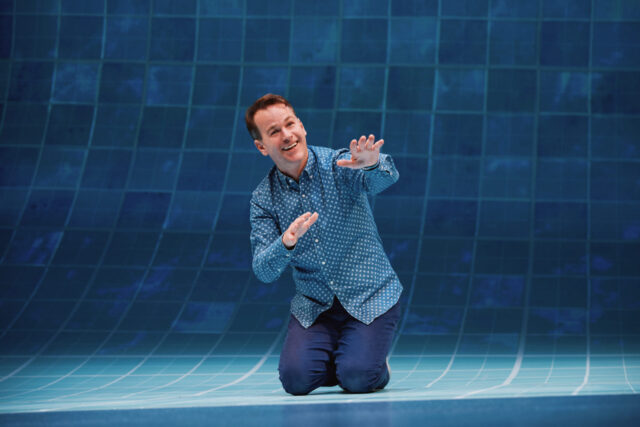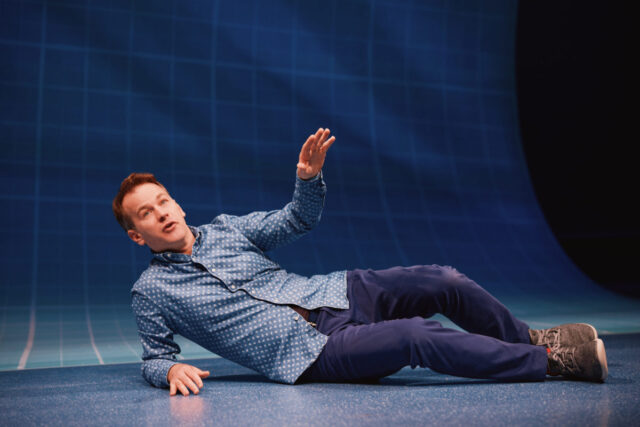
Mike Birbiglia discusses mortality with a smile in The Old Man & the Pool (photo by Emilio Madrid)
MIKE BIRBIGLIA: THE OLD MAN AND THE POOL
Vivian Beaumont Theater at Lincoln Center Theater
150 West 65th St. between Broadway & Amsterdam Ave.
Tuesday – Saturday through January 15, $104-$268
212-362-7600
www.lct.org
I remember being home sick one day in fourth grade, when I was ten, grabbing a relatively short book from my parents’ library, and reading it straight through in bed. It was the first real novel I ever picked up, called The Old Man and the Sea, by a man named Ernest Hemingway, about a fisherman facing his own mortality as he desperately tries to reel in a marlin in a life-or-death struggle, for both him and his catch. I can still feel myself turning the pages, the excitement building moment to moment.
The title, and the theme of mortality, is the jumping-off point of Mike Birbiglia’s latest one-man show, the deeply personal and extremely funny The Old Man & the Pool, continuing at Lincoln Center’s Vivian Beaumont Theater through January 15. In such past solo works as The New One, Thank God for Jokes, and Sleepwalk with Me, the Massachusetts-born, Brooklyn-based comedian and This American Life contributor has documented his REM sleep behavior disorder, his sex life, trying to conceive, and the power of jokes themselves. “There are details in my life that are both setups and punchlines,” he explained in his Broadway debut, The New One, and the same is true once again in The Old Man & the Pool, in which mortality is front and center for seventy-five hysterical, moving minutes.
The show begins with Birbiglia describing his 2017 annual physical, “which I always dread because I have a lot of preexisting conditions, which I call ‘conditions’ because everything is existing if it does and everything is ‘pre’ unless it happened on the way to the appointment. When I see that checklist I circle the whole thing and cross out ‘pregnant.’” When he has trouble blowing into a tube for a pulmonary test, his doctor tells him that based on those results, he might be having a heart attack right then and there. “I call it ‘the birthday cake test,’” Birbiglia tells the audience, “because it sort of tells you how many birthday cakes . . . you have left.” Shortly after that, the doctor tells Birbiglia that he has type two diabetes.
At the time, Birbiglia was forty-four, married to Jenny (who he calls Chlo for no apparent reason), and raising their three-year-old daughter, Oona. Both his father and his paternal grandfather had heart attacks at fifty-six. “I’ve always thought I should just set aside that whole year when I turn fifty-six and get an airbnb by the hospital and keep a flexible schedule,” he says. I understand exactly where he’s coming from; my father died of a heart attack at forty-seven, his father at fifty-seven. Those kinds of facts tend to weigh heavily on your mind.

Mike Birbiglia surfs through a serious diagnosis in latest Broadway solo show (photo by Emilio Madrid)
It’s one of the many reasons why Birbiglia’s shows work so well. He’s a kind of everyman, sharing his foibles with a genuine self-deprecation and easygoing relatability. It pains him that he was raised in a family that would say “Take care” instead of “I love you.” He also tends to come down with extreme medical conditions that are fascinating to hear about. He has to sleep in a special sleeping bag and wear mittens so his sleepwalking doesn’t result in accidentally causing harm to himself, his wife, or his daughter. In The New One, he details undergoing a varicocele repair that makes every male in the audience wince and cringe. He survived bladder cancer. And now, he’s fighting off diabetes and a potential heart attack.
He’s told that he has to start doing cardio five days a week. “I don’t think anybody does cardio five days a week,” he tells his doctor, who replies, “A lot of people do cardio five days a week.” The doctor suggests he swims at the YMCA, which brings up a poignant and profound memory for Birbiglia in which, at the age of seven, he decided he would never again go to a YMCA pool. But the thought of leaving Oona fatherless overwhelms him, and the exercise regime begins as he strives to improve his health, even if it involves changing his diet and swimming laps five days a week. It evokes Santiago, the old man in Hemingway’s story, thinking to himself, “Now is no time to think of what you do not have. Think of what you can do with what there is.” Similarly, Birbiglia asks, “Why do we not do the thing we know we should be doing?”

Mike Birbiglia takes it easy while considering death in The Old Man & the Pool (photo by Emilio Madrid)
Birbiglia, who also wrote, directed, and starred in the films Don’t Think Twice and Sleepwalk with Me, is immensely personable and self-effacing, telling his tale in a laid-back, even-tempered manner. He picks up the sole prop, a stool, and walks around the stage with it, occasionally sitting on it. He relaxes on the floor, lays down, and works off the energy of the audience. The night I went, a handful of people came in late, including a woman in the front row. Birbiglia, who was laying on his side at the time, welcomed them and decided to get them up to speed by giving them a quick, unscripted summary of what they missed. It was a brilliant moment, and one that quickly sealed the bond between us and him.
Beowulf Boritt’s set is sparse but effective: a concave board that mimics both a giant wave in its shape and a swimming pool in its gridlike design of blue squares. At times Birbiglia appears to surf under it, while at other times it looks like it is going to envelop him, drowning him. He wears jeans, comfy shoes, and an untucked blue-and-white button-down shirt that echoes the backdrop; the costume is by Toni-Leslie James, with lighting by Aaron Copp, projections by Hana S. Kim, and sound by Kai Harada, all helping develop a warm intimacy. Birbiglia’s longtime director, Seth Barrish, knows just how to keep it all moving forward as Birbiglia heads off on hilarious digressions about wrestling, mold, sugar fries, and signs such as “Slippery When Wet” and “No Breath Holding.”
The show begins and ends with the propulsive song “Red Hearse” by the LA band Red Hearse, in which Jack Antonoff, Sam Dew, and Sounwave promise, “I’ll be better than I was before / A natural, all of the past out the door / I never let you go, was all at our knees before / It’s gettin’ deeper, we’re caught up in the undertow / So come on / And if you can’t hold me / I’ll dive in it headfirst / I’ll die ridin’ in a red hearse.” In The Old Man & the Pool, master storyteller Birbiglia guides the audience through the undertow, emerging safely, and happily, from the abyss.